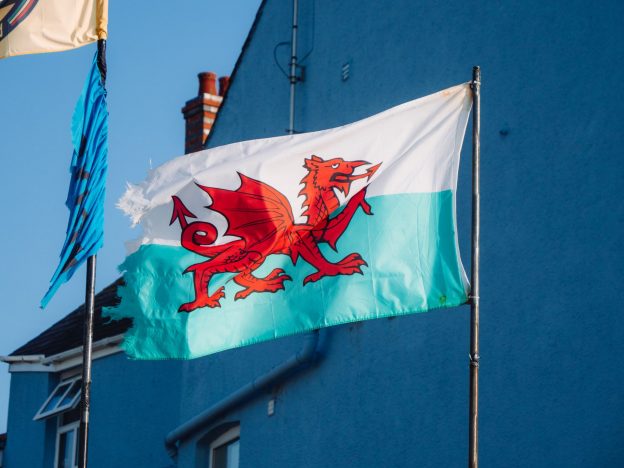Quick snippet: given my background as a native of Abergavenny (‘Mountains, Markets and More’… top tourist advertising, eh?) I am always keen to understand how bits of ‘the common law of England’ have applied in the Land of My Fathers, and so, whilst working on coverture, I have been interested in the question of how the relevant terms: ‘coverture’, ‘feme covert’, etc., would have been translated into Welsh.
This turns out to be slightly complex. The origin of ‘coverture’ etc. is clearly French, and English language sources continued to use feme covert into the twentieth century (there are even some pieces of legislation which use the term still ‘on the statute book’ – e.g. Prescription Act 1832 s.7 – so, in a sense, it is still part of English common law, offensive though that is). Add to that the fact that ‘coverture’ is not a concept which was known to ‘native’ Welsh law,[i] so that there is not a ready-made traditional word to use, and we end up with the apparently messy translation issue I have encountered.
The modern specialist Welsh-English legal dictionary,[ii] has, for ‘coverture’, bod yn wraig briod, i.e. ‘to be/being a married woman’. And I suppose for most modern purposes, that would do, though it does not quite capture the abstract nature of coverture, nor its oppressive implications. What other possibilities might there be? I have done a little digging in old newspapers, and in older dictionaries. This seemed a sensible move because, although ‘coverture’ was not a Welsh law thing, following the 13th C conquest,[iii] and 16th C union, it was part of the law applied in Wales as in England. That would mean that Welsh speakers could be expected to discuss it. How would they do so?
The answer seems to be ‘in English or French, or, if in Welsh, in a variety of different ways’ The big old 1852 (general) dictionary of Daniel Silvan Evans has seven different terms for feme covert. Some, like the modern law dictionary’s version, are essentially ‘married woman’ (gwraig briod, gwraig briodol… ) but there are a couple which are, perhaps, to be trying to link back to aspects of Cyfraith Hywel, and others which have a slightly different feel, adding an extra layer to ‘coverture’. Some link to the old idea of cowyll may be seen in ‘gwraig gowyllog’ and ‘gwraig dan gowyll’.[iv] Others emphasise the concept of nawdd – protection or patronage. Thus, we have the wordy ‘gwraig dan nawdd ac awrdurdod gwr’ and snappier ‘gwraig wrnawdd’.[v] It would certainly be interesting to consider the differences of nuance between the ‘English’ (well, French, but you know what I mean) version (no active party indicated, rather abstract, somewhat neutral in terms of hierarchical positioning) and the masculinity-emphasising, hierarchically positioning Welsh versions (dan is very much ‘under’, by the way).
For ‘coverture’, the dictionary goes for ‘gorchudd’, which might be understood more like ‘veiled’, or a series of more generally applicable words to do with lids etc. ‘Cowyll’ gets a mention. It also has ‘bod dan orchudd, nawdd, neu awdurdod gwr’ and ‘cyfiwr neu ansawdd gwraig briod, gwrnawdd, gwrnoddiad’. Both the protective, patronage-indicating nawdd and the emphasis on the masculinity of the protector are seen in the usage dan nawdd ei gwr which is the translation in an 1882 Welsh language newspaper of ‘under coverture’.
So – preliminary investigations suggest that this is a bit involved. The politics of translation, especially as between the languages of a conqueror and the conquered, are pretty complex, and this, I suppose, is an area which will have seemed obsolete before the renaissance of legal Welsh, and technical translation, in the twentieth and twenty-first centuries. There may not be one answer, therefore. But an interesting question, on’d ife?
GS
17/04/2022
[i] That sounds positive, doesn’t it, but in fact it’s not because life was great for medieval Welsh women under Cyfraith Hywel – it’s because women just generally could not hold real property, so there was no need to create that sort of abstract idea to handle their status. Weirdly, it is probably the less discriminatory nature of English common law land rules – women disadvantaged but not disqualified – which contributed to lawyers coming up with ‘coverture’. So an oppressive idea arose from a situation of marginal advantage … Women’s history is twisty!
[ii] Robyn Lewis, The New Legal Dictionary (English-Welsh) Gomer Press, Llandysul, Ceredigion, 2003, p.266. Thanks to Gwilym Owen for putting me on to this!
[iii] (still time to pull it back … Owain will come again etc. etc.)
[iv] Cowyll was a payment to a new wife, after consummation of the marriage, a recognition of her (now ‘lost’) virginity. (It’s gowyll here due to a soft mutation following dan, in case you are wondering …)
[v] Extra bonus find on this trawl – the existence of something called a ‘cover-slut’ – some sort of apron to hide one’s dirty clothes (in Welsh, bryntgudd). Definitely one to introduce into everyday conversation wherever possble…
Image: ragged dragon flag … I am sure it says something profound about nations, language etc. etc., but will leave you to draw your own conclusions … Photo by Chris Curry on Unsplash
